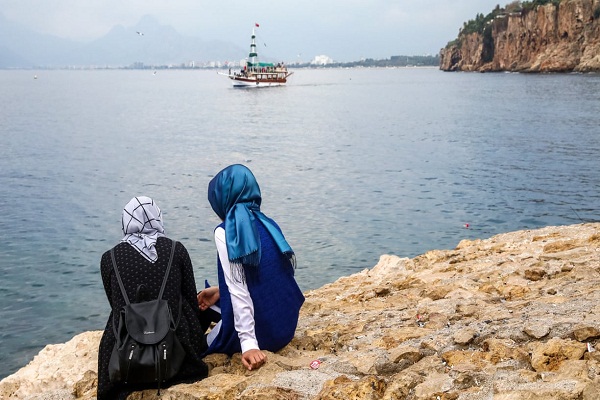Halal Holiday Bookings Soar

Driven by a rapidly expanding global population and a burgeoning middle class, overall Muslim lifestyle spending – including food, fashion, cosmetics, media and recreation – was worth an estimated $2.1tn in 2017.
The report – produced annually by analyst Thomson Reuters – says that the halal travel sector is “spreading its wings through offering cultural, historical, religious and beach tourism. Muslim-friendly beach resorts are proving particularly popular.”
Muslim spending power has never been stronger – and hoteliers on the Turquoise Coast have been quick to respond. Some have converted existing hotels to be halal-friendly; other purpose-built resorts are springing up. Their restaurants serve halal food. The premises are alcohol-free. They provide prayer rooms and mosques, and broadcast the call to prayer over public address systems.
Most resorts have screened-off women-only pools and beach areas, in which women can sunbathe in bikinis without fear of being seen by men. Boys over the age of five or six are banned, along with cameras and mobile phones. Spas and gyms have separate opening times for men and women. Organized entertainment is “family-friendly”.
Basma Kahie, a fashion blogger, said she had previously had doubts about taking holidays because of the difficulties facing Muslim families. But after visiting a halal-friendly resort in Antalya, Turkey last year with her husband and daughter, she was planning another holiday, this time with friends.
“It was amazing not to have to worry about things that might compromise my religious beliefs,” she told the Observer.
According to Ufuk Secgin of HalalBooking.com, which caters for Muslim tourists, “absolutely there is a boom in this sector; we see it and feel it every day. There is a growing Muslim middle class. The first generation [of immigrants to the UK] tended to work in low-skilled jobs, but in the second and third generations we see more doctors, lawyers, people working in finance and so on.
“They want to take two or three holidays a year, not just an annual visit to their grandparents or relatives in their home country. They want to see the world – beach holidays, city breaks, heritage sites – and they have money to spend.”
Bed capacity in halal-friendly hotels along the Turquoise Coast in Turkey had increased by 450% in the past five years, said Secgin. About 18 months ago, the Turkish government set up a halal accreditation authority to provide certification to hotels and resorts. Turkey also has the world’s first halal-friendly ski hotel in the Uludag resort.
Muslim tourism is still largely focused on the Persian Gulf, with Saudi Arabia the top destination because of its custodianship of the Muslim holy sites, Mecca and Medina, which attract millions of pilgrims each year.
The kingdom accounted for $21bn of Muslim travel spending in 2017, with the United Arab Emirates, Qatar and Kuwait next on the league table. Other countries attracting large numbers of Muslim travelers were Indonesia, Malaysia, Iran, Russia and Nigeria.
But, increasingly, countries with small Muslim populations are waking up to the potential of the halal travel market. Two hotels on the Costa del Sol in Spain serve only halal food and are alcohol-free. A handful of small hotels in London and other European cities have similar policies.
According to Soumaya Hamdi, who runs the online Halal Travel Guide, alongside her job as a Whitehall civil servant, many destinations have halal-compliant restaurants and accommodation but, until recently, it was hard to find reliable information about them.
She started writing about halal travel after a road trip to South Korea and Japan with her husband and baby daughter in 2015. The response was “tremendous”, she said.
“There is a new generation of Muslims who are well-educated and professional with quite a lot of purchasing power. They see amazing destinations online, and they want to travel,” she said.
“When I was a child, my family had to make do. On holiday, we had to self-cater or eat vegetarian or fish and chips, and that was that. Going to the beach was a nightmare – there was no such thing as a burkini then. But as Muslims have become more affluent, businesses have realized the strength of the Muslim pound.
Food was important, she said. “A big aspect of travelling for everyone is trying out new cuisines. It’s not just a question of finding halal food, but finding authentic local food that is also halal.”
There was also an increasing number of Muslim women – “unmarried, professional, with money” – who wanted to travel alone or in small groups. Other travelers wanted more “immersive experiences that enrich the soul and mind”.
She said: “The last 10 years have been about meeting the basic needs of Muslim travelers. The next stage is to take it further to new destinations and authentic experiences.”
Source: The Guardian



